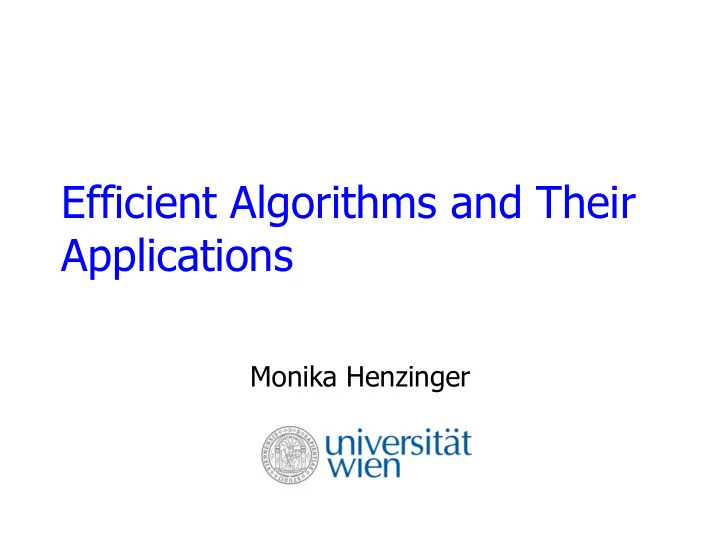

Efficient Algorithms and Their Applications Monika Henzinger
Efficient algorithms Topics : Algorithm analysis and complexity, data structures, combinatorial optimization, algorithmic game theory Main conferences : STOC, FOCS, SODA , ICALP, ESA, EC SODA 2012: 523 submissions, 138 acceptances Thriving theory community
Impact? Personal experience at Google : Undergraduate algorithms knowledge is bread-and- butter Data structures in C++ STL Current research topics generate little interest Except for algorithmic game theory Very different from Information Retrieval Possible reasons: “Life” does not require complicated algorithms often The research community is working on the wrong problems The research community is using the wrong evaluation criteria
Evaluation criteria Knuth: ". . .we want good algorithms in some loosely defined aesthetic sense. One criterion . . . is the length of time taken to perform the algorithm . . .. Other criteria are adaptability of the algorithm to computers, its simplicity and elegance, etc" I would add: “ and how it works on real-life data sets .”
Task scheduling in Google cloud Given cluster of 1000s of machines with different properties Online setting : Whenever a new job arrives it is partitioned into 100s- 1000s of task that have to be assigned to machines To which machines to assign the tasks? Theory research : Multi-processor scheduling Offline problem is NP-hard Large set of approximation algorithms: First-fit, best- fit, sum-of-squares, worst-fit Different evaluation criteria: Minimize make-span, minimize waiting time, …
Practical constraints Evaluation criterion 1: Maximize resource utilization (throughput) Collected data from 8 data centers: Distribution of tasks lengths and arrival rates and times very inconsistent None were close to capacity, all algorithms performed the same Evaluation criterion 2: Ability to handle more jobs on same cluster of machines in same time None of the previous evaluation measure fits Simulation hard since increase in load cannot be easily simulated
Practical solution Randomly select 40%, 60%, 80 % … of the machines and check in simulator how many tasks complete in fixed time interval Throughput 40% 60% 80% 100% Available machines Tested 11 algorithms 3 evaluation criteria: throughput, time spent for useful work, machine fragmentation
Task scheduling in Google cloud Thorough study Best-Fit clearly best Has been running in Google cloud since 2009 Google presented this work at 2011 Faculty Summit … but we never published it
Applied algorithms work Publication venues: Workshop of Experimental Algorithms Not highly regarded SODA Paper needs to mostly contain new theory and then experimental results confirming them Conferences in the field, e.g. Cloud Computing Conference Needs to know the conference No good option available! Disincentive to do applied algorithms work
Life of algorithms researcher x years of algorithms research want to NO YES have practical impact ? Goto field XYZ Stay in algorithms and never come community Schism back to algorithms community Big drain for the algorithms community Feedback from the field is missing
Other communities Example: Information Retrieval community Theoretical as well as practical work is valued Standard data sets for experiments Continuously looking for input from computer scientists in the field and adapting set of problems of interest Algorithms community could learn from them Every algorithms researcher can learn from them
Life of algorithms researcher x years of algorithms research want to NO YES have practical impact ? Goto field XYZ and Stay in algorithms never come back to community algorithms community Talk to users of Stay in touch with algorithms to validate algorithms community research topics and propose new Study new problems problems
Success Story: Algorithmic Game Theory Design algorithms in strategic environments: Decisions need to made with self-interested participants Example: m items need to be assigned to n bidders Goal: Conditions to be fulfilled by the outcome, e.g. social-optimum solution Example: Items are given to bidders that value them most Equilibrium concept: Truthfulness: The participants achieve the highest utility if they give truthfully input (independent of the input of the others) Nash equilibrium: At the given solution no participant achieves higher utility by giving a different input (dependent on the input of the others) …
Algorithmic Game Theory: Big Picture Complexity questions: PPAD, computing Nash Equilibrium Algorithmic Mechanism Design: Mechanism Design Theory Quantifying In- Combinatorial Auctions efficiencies of Equilibria: Sponsored Search Auctions Price of Anarchy Social Choice Theory: Which functions can be computed? Advanced Topics: Pricing questions in other settings; Learning; …
Algorithmic Game Theory Close interaction with economists and companies such as web search engines that run internet auctions Quickly adapting to new problems of interest Running time is secondary, but equilibrium concepts “enforce” simple algorithms
Schism in teaching Typical 1 st year bachelor algorithms class Class: Definitions, algorithms and proofs Homework: Proofs Exams: More proofs Applications briefly mentioned Theory-only class
Schism in teaching (cont.) 1 st year bachelor algorithms class at University of Vienna Designed by database/hpc researchers Class: Definitions and algorithms Homework: Semester-long implementation project Evaluated in comparison to other students Exam: Algorithms Proof-free class
Feedback to the student Running time Input size
Algorithms Teaching Ideal 1 st year bachelor algorithms class Class: Definitions, algorithms, and proofs Homework: Proofs and implementation Designed with applied researcher Exams (with low weight): Algorithms and proofs Overcome the schism!
Algorithms Teaching Important material missing in basic algorithms class: Data streams Online algorithms Randomized algorithms Approximation algorithms Should be taught in second required algorithms class
Recommend
More recommend